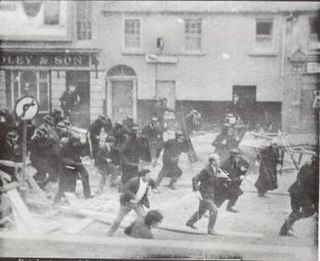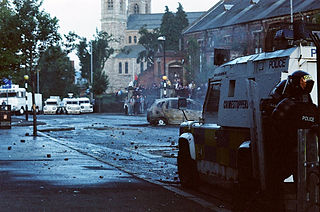Related Research Articles

Free Derry was a self-declared autonomous Irish nationalist area of Derry, Northern Ireland that existed between 1969 and 1972 during the Troubles. It emerged during the Northern Ireland civil rights movement, which sought to end discrimination against the Irish Catholic/nationalist minority by the Protestant/unionist government. The civil rights movement highlighted the sectarianism and police brutality of the overwhelmingly Protestant police force, the Royal Ulster Constabulary (RUC).

During 12–16 August 1969, there was an outbreak of political and sectarian violence throughout Northern Ireland, which is often seen as the beginning of the thirty-year conflict known as the Troubles. There had been sporadic violence throughout the year arising out of the Northern Ireland civil rights campaign, which demanded an end to discrimination against Catholics and Irish nationalists. Civil rights marches had been attacked by Protestant loyalists, and protesters often clashed with the Royal Ulster Constabulary (RUC), the overwhelmingly Protestant police force.
This is a chronology of activities by the Continuity Irish Republican Army (CIRA), an Irish republican paramilitary group. The group started operations in 1994, after the Provisional Irish Republican Army began a ceasefire.
The city of Derry, Northern Ireland, was severely affected by the Troubles. The conflict is widely considered to have begun in the city, with many regarding the Battle of the Bogside in 1969 as the beginning of the Troubles. The Bloody Sunday incident of 1972 occurred in Derry, in the Bogside area.
This is a timeline of actions by the Irish republican paramilitary groups referred to as the Real Irish Republican Army and New Irish Republican Army. The Real IRA was formed in 1997 by disaffected members of the Provisional IRA. Since July 2012, when Republican Action Against Drugs (RAAD) and other small republican groups merged with it, the group has been called the New IRA; although it continues to call itself simply "the Irish Republican Army".
Republican Action Against Drugs (RAAD) was an Irish republican vigilante group active mainly in Derry and the surrounding area, including parts of counties Londonderry and Tyrone in Northern Ireland, and parts of County Donegal in the Republic of Ireland. It targeted those who it claimed were drug dealers. The group's methods included shooting the alleged dealers in the arms and legs ; pipe bomb or arson attacks on the property of alleged dealers; and warning, threatening or banishing the alleged dealers.
Óglaigh na hÉireann is a small dissident Irish republican paramilitary group that took part in the dissident Irish republican campaign. The organisation started carrying out attacks around 2009 and was formed after a split within the Real IRA, led by Seamus McGrane.

The dissident Irish republican campaign began at the end of the Troubles, a 30-year political conflict in Northern Ireland. Since the Provisional Irish Republican Army called a ceasefire and ended its campaign in 1997, breakaway groups opposed to the ceasefire and to the peace agreements have continued a low-level armed campaign against the security forces in Northern Ireland. The main paramilitaries involved are the Real IRA, Continuity IRA and formerly Óglaigh na hÉireann. They have targeted the Police Service of Northern Ireland (PSNI) and the British Army in gun and bomb attacks as well as with mortars and rockets. They have also carried out bombings that are meant to cause disruption. However, their campaign has not been as intensive as the Provisional IRA's, and political support for groups such as the Real IRA is "tending towards zero".

The 2011 Northern Ireland riots were a series of riots between 20 June 2011 and 16 July 2011, starting originally in Belfast, before spreading to other parts of Northern Ireland. They were initiated by the Ulster Volunteer Force.

From 6 to 11 July 1997 there were mass protests, fierce riots and gun battles in Irish nationalist districts of Northern Ireland. Irish nationalists/republicans, in some cases supported by the Provisional Irish Republican Army (IRA), attacked the Royal Ulster Constabulary (RUC) and British Army. The protests and violence were sparked by the decision to allow the Orange Order to march their traditional route, passing through a Catholic/nationalist neighbourhood of Portadown. Irish nationalists were outraged by the decision and by the RUC's aggressive treatment of those protesting against the march. There had been a bitter dispute over the march for many years.
During the 2012 North Belfast Riots sectarian disorder and rioting between loyalists and republicans occurred when rival parades, authorised by the Parades Commission, took place.

On 3 December 2012, Belfast City Council voted to limit the days that the Union Flag flies from Belfast City Hall. Since 1906, the flag had been flown every day of the year. This was reduced to 18 specific days a year, the minimum requirement for UK government buildings. The move to limit the number of days was backed by the council's Irish nationalists while the Alliance Party abstained from the vote; it was opposed by the unionist councillors.

Saoradh is a far-left political party and pressure group formed by dissident Irish republicans in 2016. It is active in both the Republic of Ireland and Northern Ireland. The Police Service of Northern Ireland and independent commentators describe the party as being close with the New IRA, although Saoradh themselves deny this.
The 2005 Belfast riots were serious loyalist riots and civil disturbances in Belfast, Northern Ireland in September 2005. The violence broke out after the Protestant Orange Order Whiterock parade was re-routed to avoid the Irish nationalist Springfield Road area. Clashes also broke out in several towns in County Antrim. The incidents took place amid a fierce feud between members of the Ulster Volunteer Force (UVF) and Loyalist Volunteer Force (LVF), who are also thought to have orchestrated the riots.

The 2002 Short Strand clashes, also known as the siege of Short Strand, was a series of major sectarian violence and gun battles in and around the Short Strand area of east Belfast – a mainly Irish/Catholic enclave surrounded by Protestant communities. Although violence had occurred many times throughout 2002, this article deals with the worst episode in June.
The 2010 Northern Ireland riots were riots and civil disturbance in Northern Ireland in July 2010, orchestrated by Irish republicans.
Large civil disorder broke out in north Belfast, Northern Ireland on Sunday 11 November 2001. The trouble started when republicans clashed with loyalists during a Remembrance Day service. Up to 400 Protestants and Catholics were involved in rioting in the afternoon on North Queen Street.
Events from the year 2021 in Northern Ireland.
A series of riots in loyalist areas of Northern Ireland began in Waterside, Derry, on 30 March 2021. After four nights of rioting in Derry, disturbances spread to south Belfast on 2 April, where a loyalist protest developed into a riot involving iron bars, bricks, masonry and petrol bombs. Following this, civil unrest spread to Newtownabbey on 3 April, where cars were hijacked and burnt, and petrol bombs were also used against police. Carrickfergus in southern County Antrim also saw serious civil unrest on the night of 4 April and morning of 5 April, where loyalists created roadblocks to keep police out of local estates and threw petrol bombs at police vehicles.
The New Irish Republican Army, or New IRA, is an Irish republican paramilitary group. It is a continuation of the Real Irish Republican Army, which began to be called the 'New IRA' in July 2012 when Republican Action Against Drugs (RAAD) and other small republican militant groups merged with it. The group calls itself simply "the Irish Republican Army". The New IRA has launched many attacks against the Police Service of Northern Ireland (PSNI) and the British Army. It is the largest and most active of the "dissident republican" paramilitary groups waging a campaign against the British security forces in Northern Ireland.
References
- ↑ "Violence continues in Derry as 74 petrol bombs are thrown in a single night" . independent.co.uk. 13 July 2018. Archived from the original on 1 May 2022.
- ↑ Young, David (13 July 2018). "'New IRA' blamed for trying to kill police officers during Londonderry rioting". dailyrecord.co.uk.
- ↑ "'Police and children under threat'". BBC News. 13 July 2018.
- ↑ "Londonderry riots orchestrated by cowards hiding in the shadows: Doug Beattie". Belfasttelegraph– via www.belfasttelegraph.co.uk.
- ↑ "Gerry Adams demands bombers who attacked his house explain why" . The Independent. Archived from the original on 1 May 2022. Retrieved 24 July 2018.
- ↑ Ainsworth, Paul (16 July 2018). "Video: CCTV captures attack on Gerry Adams' home". The Irish News. Retrieved 24 July 2018.
- ↑ "'Explosive' thrown at Gerry Adams' house". BBC News. 14 July 2018.
- ↑ Young, Connla (20 July 2018). "'IRA' claims responsibility for Derry attacks". The Irish News. Retrieved 24 July 2018.